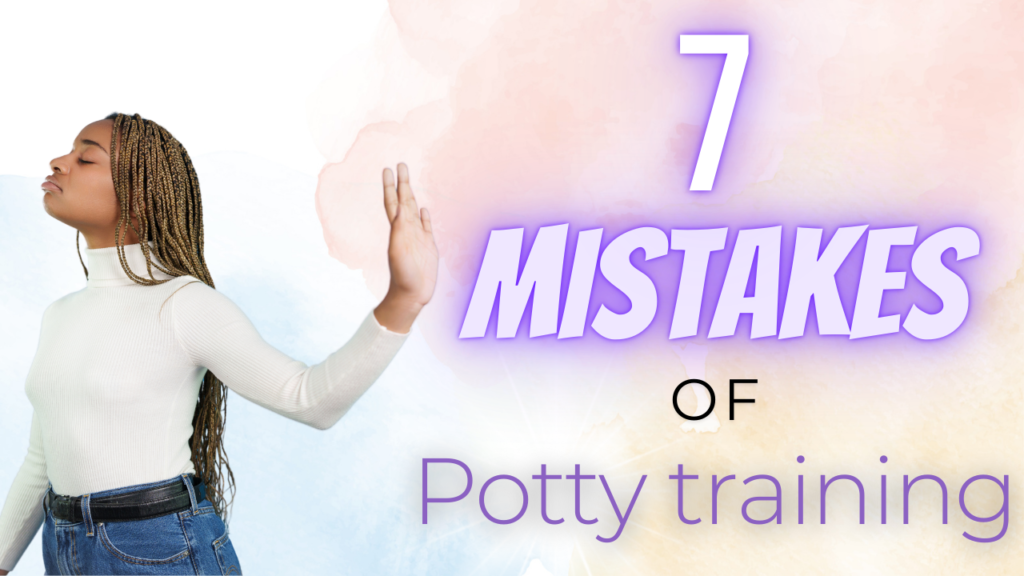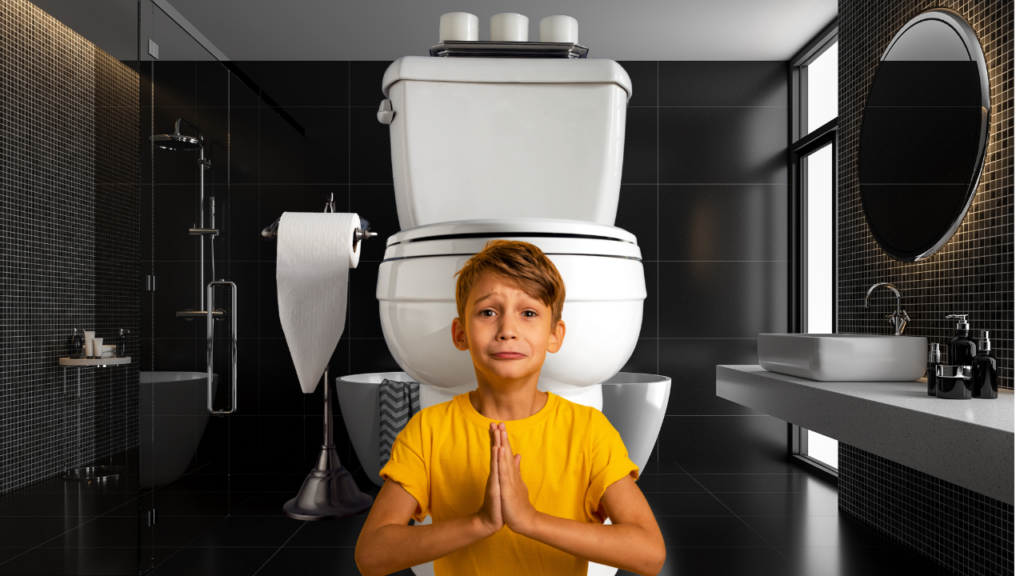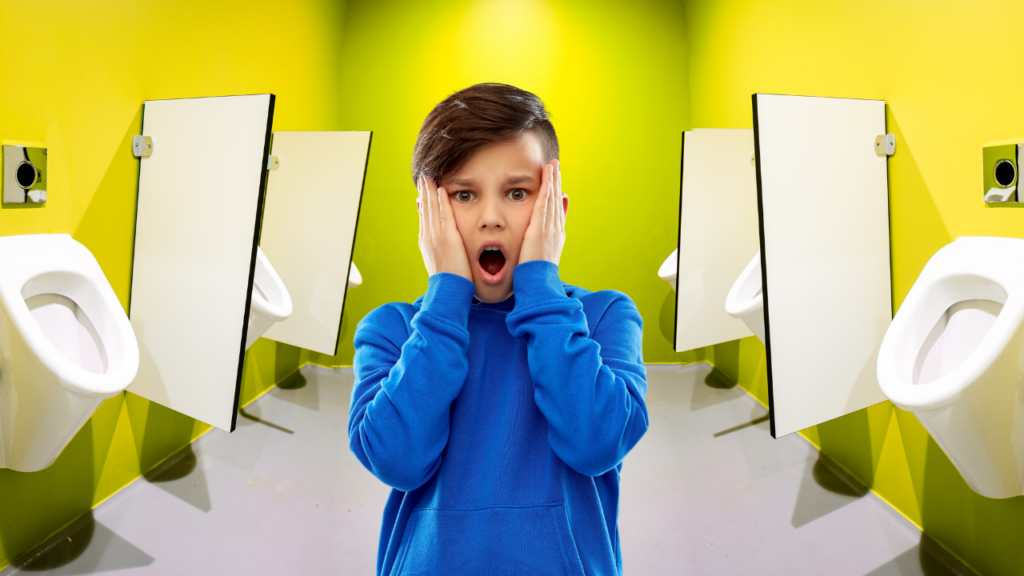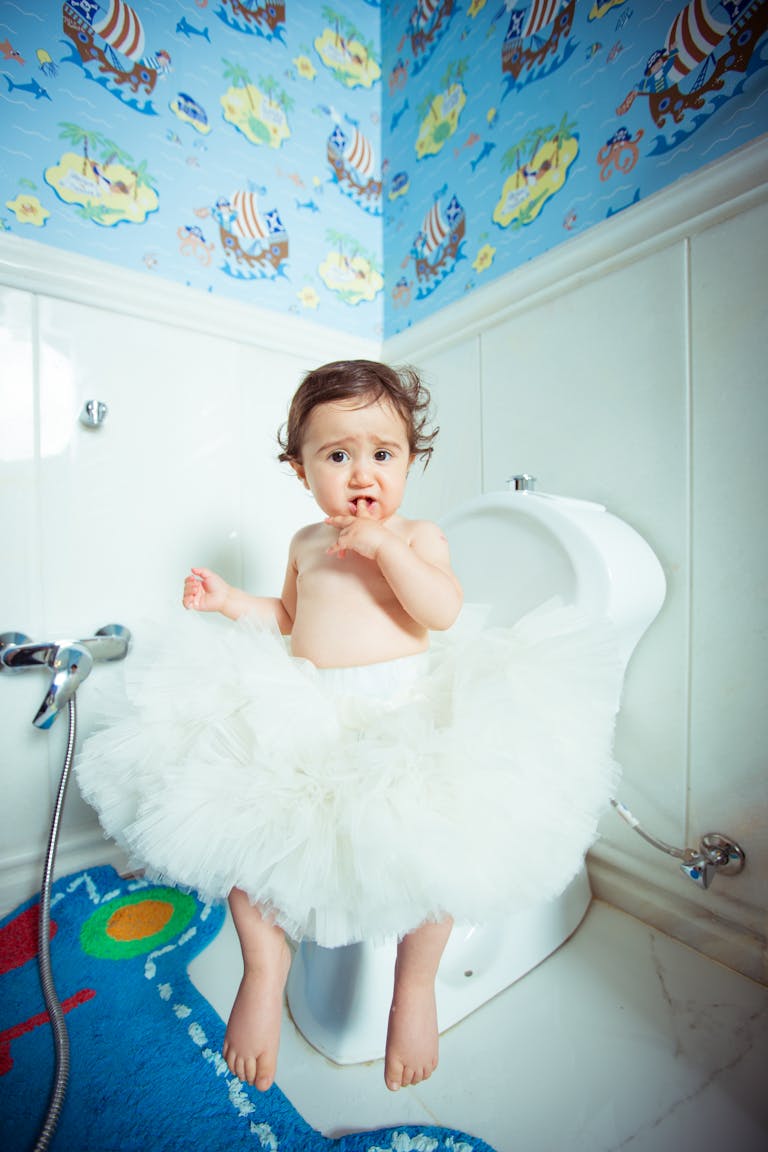7 Common Potty Training Mistakes Parents Make

Hi potty training warriors!
As a mom of three who’s been through the potty training journey twice (with very different experiences each time), I know firsthand how challenging this milestone can be.
I remember sitting on my bathroom floor, feeling completely defeated as my first born son refused to even look at the potty chair I’d enthusiastically purchased.
Looking back now, I can laugh about it – but at the time, it felt like I was failing at one of parenting’s most basic tasks.

If you’re reading this, chances are you’re either preparing for or in the midst of potty training your little one. Take a deep breath – you’re not alone, and those challenging moments don’t define your parenting journey.
Let’s explore 7 common potty training mistakes we parents make during potty training (trust me, I’ve made quite a few myself!) and learn how to navigate this important milestone with more confidence and less stress.
1. Starting Too Early or Too Late

One of the biggest mistakes I see parents make (and yes, I was guilty of this with my firstborn) is rushing into potty training before their child shows signs of readiness. I was so eager to get my son out of diapers that I missed all the signs telling me he wasn’t ready yet.
Your child needs to be physically and emotionally ready for potty training. Starting too early can lead to frustration for both you and your little one, while waiting too long might make it harder to break established habits.
My neighbor’s daughter actually trained herself at 2 years old – she simply announced one day that she was ready for
“big girl underwear”
and that was that! Every child truly is different.

Signs of Readiness Include
2. Being Inconsistent with the Routine

Remember my earlier bathroom floor moment? Part of our initial struggle was my inconsistent approach. One day I’d be all in, the next day I’d be too busy with work and revert to diapers.
This back-and-forth confused my son and delayed our progress significantly.

Consistency is key in potty training. Once you start, stick to your chosen method and routine. This doesn’t mean you can’t be flexible when needed, but maintaining a general structure helps your child understand what’s expected of them.
3. Using Negative Reinforcement

This is a tricky one that many parents (myself included) fall into without realizing it. Showing disappointment, getting frustrated, or using phrases like “big kids don’t have accidents” can create anxiety and resistance around potty training.
Instead of focusing on mistakes, celebrate every small victory.

Remember, your child isn’t having accidents to upset you – they’re learning a completely new skill. It’s like expecting an adult to learn a new language overnight!
4. Forgetting to Praise Success

Speaking of celebration, here’s where I got it right with my second child! After learning from my first experience, I turned potty training into a celebration of success rather than a dreaded task.
Create a positive atmosphere around potty training. This doesn’t mean you need elaborate reward systems (though some children respond well to sticker charts).
Simple, genuine praise can work wonders:
“Wow, you listened to your body and made it to the potty! That’s amazing!”
5. Expecting Overnight Success

Oh, how I wish I could go back and tell my younger self this one! Potty training is rarely a linear process. There will be progress, setbacks, and everything in between.

Think of it like learning to ride a bike – some kids pick it up quickly, others need more time and practice. Neither approach is wrong, and both eventually lead to success.
6. Comparing Your Child’s Progress to Others

Every child’s potty training journey is unique, yet it’s tempting to worry when your friend’s child seems ahead of yours.
I remember feeling anxious when my son’s daycare classmate was fully trained while we were still working on basics. What I’ve learned is that focusing on other children’s progress only adds unnecessary pressure to an already challenging process.
Whether your child trains at 18 months or 3 years old, they’ll get there in their own time.
Trust your child’s individual development and celebrate their personal victories, no matter how small.
7. Assuming Your Child Will Be Comfortable Using Public Restrooms

The first time I tried taking my son into a busy mall bathroom, he completely shut down.
The loud hand dryers, unfamiliar toilets, and echoing sounds were overwhelming for him. I learned that while home training was going well, public restrooms were a whole different challenge.
Take time to prepare your child for different bathroom environments – talk about automatic flushers, practice in quieter public restrooms first, and always validate their concerns.
Remember that feeling safe and secure is essential for potty training success, no matter where you are.
Potty Training Challenges and How to Overcome Them
Every potty training journey has its hurdles. Here are some challenges you might face and how to handle them:
Fear of the toilet? Try a child-sized potty or a secure seat reducer. My son was terrified of falling in until we found a comfortable seat that made him feel secure.
Resistance to sitting on the potty? Make it fun! We kept a special basket of books and small toys that were only available during potty time.
Refusing to go at crucial moments? Stay calm and maintain the routine. Sometimes taking a step back for a few days can help reset the situation.
Frequently Asked Questions
Q: What’s the ideal age to start potty training?
A: There’s no one-size-fits-all answer, but most children show readiness between 18 months and 3 years old. Focus on your child’s individual signs of readiness rather than age.
Q: How long should potty training take?
A: Every child is different. Some might grasp it in a few days, others might take several months. The key is consistency and patience.
Q: Should I use rewards for potty training?
A: Small rewards can be effective motivators for some children, but praise and encouragement are often enough. If you choose to use rewards, keep them simple and gradually phase them out.
Easy Tips for Potty Training Success
Wrapping Up: Key Takeaways for Potty Training Success
Remember, every child is unique, and what works for one might not work for another. Trust your instincts, stay patient, and know that this phase will pass. You’re doing a great job, even when it doesn’t feel like it!
Have you been through the potty training journey? Share your experiences with the largest potty training community on Facebook – your story might help another parent who’s right in the middle of it all.
Follow us on Facebook for more parenting tips and support! Did you find this article helpful? Share it with other parents who might need these tips!
xoxo






